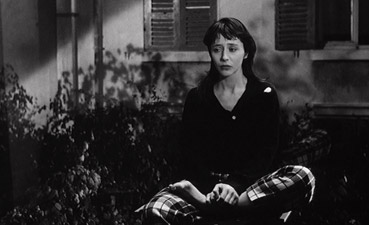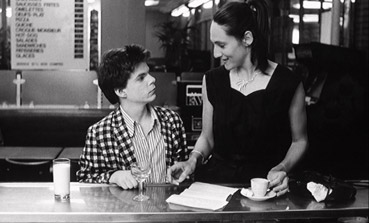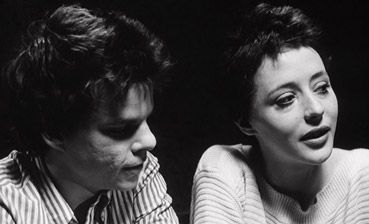|
Leos
Carax's first feature is certainly true to its title. The ground for this promised encounter is being
laid in the opening scenes, as we are presented with two individuals whose lives in transition
and for whom loneliness is either destructive or an unacceptable
state of being. It's not an even balance – one will find
the other, but there's the suggestion that maybe that other
doesn't want to be found. Although made in 1984, stylistically
the film has a flavour of the Novelle Vague, from its monochrome
photography and its lead actress's late story 60s-style cropped
haircut to the Godardian use of mid-shot black inserts,
but its sense of alienation and detachment are as 80s as
they come.
It
starts intriguingly, with a woman taking a night-time drive to throw
the paintings and poems of the man she has just walked out
on into the river, though fefore doing so, she phones him to
tell him what she's about to do. This actually triggered an odd memory
for me. Years ago, I fought tiredness to stay up late and
provide moral support for a female friend who had promised
her boyfriend, who was on tour with his band, that she'd
record every episode of a TV series that he loved. They
were being screened at something like 1.00am, but she stayed up and recorded them rather than set the timer because he wanted the ad breaks edited
out. The things we do for love, huh? One night she turned
to me and with the prettiest of smiles said: "You
know when relationships deteriorate to that point where
you start to hate each other and you know that the only
logical thing to do is leave? I've already decided that
when that happens to us, before I go I'm going to wipe
every one of his video tapes." She still loved him
and yet she was already planning her punishment for his
later failings. As it turned out, it was she who eventually cheated
on him.

The
point of this little aside, if indeed it had one, relates
to that thing that movies sometimes do so well, stage a small
moment that touches you in unexpected ways, that draws you
in not through its characters or storytelling per se, but
through a sort of created kinship that suggests you and
the filmmaker have shared an experience, a first-step connection
to the story to be told. In Boy Meets Girl,
I'd just taken that step. A short while later, we're introduced to the jilted
lover Alex (Carax regular Denis Lavant), who, after lamenting
his loss to his best friend Thomas, attacks and attempts
to strangle him for being the one that his girlfriend left him for. There
are playful little moments here that continue the intrigue,
as Thomas struggles to pull out a knife only to find he's
too weak to use it. When it falls to the ground, Alex releases
him out of surprise that his best friend should do something
as outrageous as pull a weapon on him.
Also
busting up with her partner is Mireille (Mireille
Perrier), whose parting conversation with her former lover Bernard is conducted over her apartment intercom, the street half of which is witnessed by chance by the mesmerised Alex, who has taken
to wandering the streets to get his head straight. He follows
Bernard to a bar packed with pinball machines and whose ambience is dominated by an old
man bellowing his name into a phone for someone who is clearly
unable to spell it ("Bouriana! That's B as in Bouriana,
O as in ouriana, U as in uriana...!"). Alex's exact
intentions as he sidles up beside Bernard at the bar are
teasingly uncertain, but when Bernard drops a piece of paper
Alex pounces on it, then buying a coffee for a woman comically
taller than himself to disguise his actions. The paper turns
out to be an invitation to a party, one that both he and the
film put aside for a while.
All
of this and more unfolds with a mixture of casually paced
cinematic detachment and offbeat asides, a technique that
works well for a while but loses a little of its charm once
you begin to suspect that this is about as close to Alex
as we're likely to get. We watch him rather than feel for
him, with the only real windows into his personality at this
stage provided by a phone call from his father angrily
reminding him of a particularly grim pact the two have agreed
on, and a map he has drawn on the wall detailing the significant
moments of his life. These include his place of birth, his first shoplifting
experience, his first meeting and first kiss with the departed
Florence, as well as his first lie to her (which takes place
at Pont-Neuf, the famed location of the director's most
notorious work). He is now able to add "first
murder attempt."

From
his initial encounter with her voice, Alex seems almost
mystically drawn to Mireille, memorably realised as he walks
the streets, his eyes closed and his arms outstretched with
David Bowie's When I Live My Dream blasting in
his ears (his weighty tape recorder and huge headphones
will probably look to younger viewers like a Flintstones
iPod). This is intercut with Mireille tap dancing in a moment of
rarely observed contentment, lost in her movements and a
song she cannot hear – earlier we watch her roll her head
furiously to The Dead Kennedys' Holiday in Cambodia,
similarly detached from the real world until interrupted
by Bernard's blast on the intercom.
The
party at which Alex and Mireille are destined to meet cranks
the cinematic temperature down a couple more notches while
continuing to flirt with the offbeat, such as the baby-filled
telephone room or the deaf-mute old man who regales Alex
with tales of his time as a dolly grip in the days of silent
cinema. This is a strangely gloomy gathering, the sort of
function David Lynch might attend if he was spending his
last year at Marienbad, an atmosphere that reflects the suppressed despair of
its American hostess. When Alex and Mireille finally, properly
meet, we are presented with the flipside of the standard
romantic pay-off, with conversation and self-analysis taking
the place of the emotional connection that the film has
seemingly been building to, an intellectualisation of an
essentially irrational emotion that Mireille no longer appears
capable of or interested in feeling. It's a long (the party
constitutes most of the film's second half) but nonetheless
curiously involving exchange, a self-examination of two
lives that I have little doubt was drawn from Carax's own
experience. It has, after all, long since been accepted that Levant's
Alex is the on-screen incarnation of the director in his first
three features.
More
than once I've seen Boy Meets Girl described
as dreary, an assessment I'd emphatically disagree with.
Despite the melancholia and depression suffered by its characters,
a certain cinematic coldness created in part by Jean-Yves
Escoffier's beautifully steely monochrome photography, and
an ending that plays more like the climax of a dark dance
piece than a naturalistic film drama, Boy Meets Girl
is an often intriguing, sometimes dream-like and, just occasionally,
blackly humorous drift through a chilly landscape of youthful
angst. But the film's key asset has to be Denis Levant,
without question one of the most interesting faces in European
cinema and a model here of buried frustrations and uncertainty.
It's his controlled but enigmatic performance and the impulsive
desires of his character that most clearly signal the direction
that Carax was to head with his next two films.
Framed
1.66:1 and anamorphically enhanced, the transfer here is
just lovely, doing real justice to Escoffier's beautiful
black and white cinematography. Contrast and detail are
excellent, and black levels, so important to the look here,
are perfect. Tonally the transfer has just the right feel
to it – there's never the sense that anything has been lost
to the shadows or highlights.

As
with all of the films in the collection, the only audio
option here is French Dolby 2.0, in this case a mono track.
It's clear enough, though its dynamic range is a little
limited.
Introduction
by Denis Lavant (8:09)
Not the retrospective look back you might think from the
title, this was shot on low band video at, I'm guessing,
the casting or pre-shooting stage. It features the 22-year-old
Lavant introducing himself and talking about the character
of Alex, but having to do so with Bowie's When I Live
My Dream blasting in his ears through headphones. A
little explanation of Carax's motivation for this would
have been nice.
On
Set "In the Kitchen" (17:36)
An odd one this, a record of some of the kitchen shoot,
but filmed by pointing the camera at the playback monitor
screen, which restricts the viewpoint and is not exactly
sparkling quality. It's interest value is, well, not that
great, despite the pre-take and post-take moments caught.
A
film that has grown on me with successive viewings, where
its qualities, not to mention its sly humour, have become
more evident. It's still an admittedly downbeat piece, but
a seductively made and always interesting one, and it looks
just lovely on Artificial Eye's DVD. Of the three films
in the set, Mauvais
Sang is definitely my favourite, but Boy
Meets Girl comes in a respectable second.
|